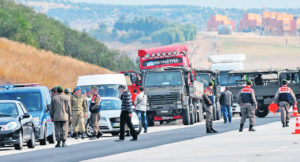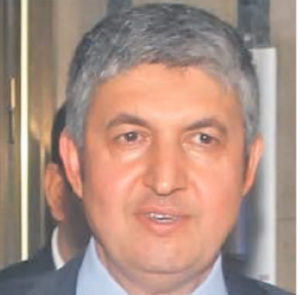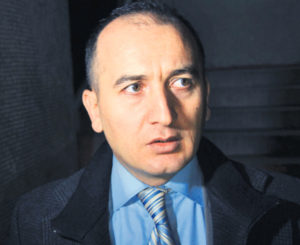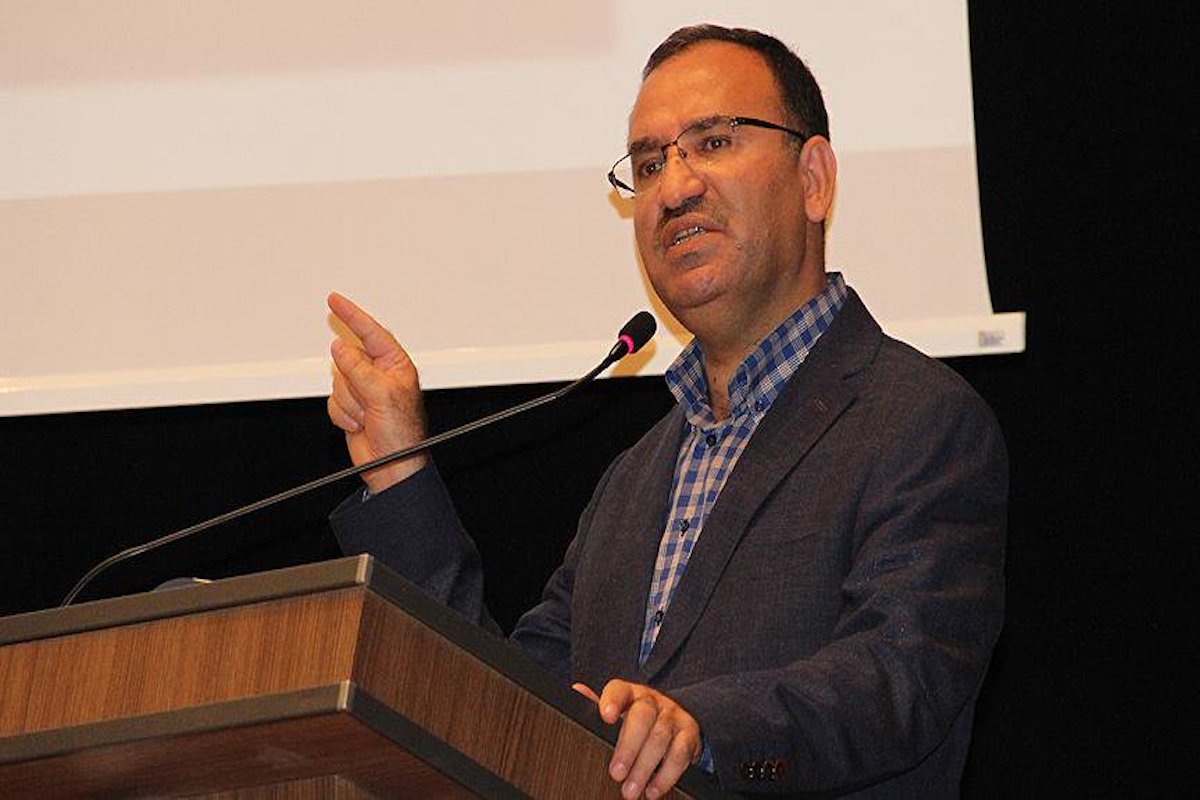Turkey’s new justice minister, Bekir Bozdağ, appointed by President Recep Tayyip Erdoğan on January 28, 2022, was investigated by counterterrorism prosecutors in 2014 for aiding and abetting al-Qaeda.
The investigation into Bozdağ was launched by prosecutors in Adana province, located near the Syrian border, after he illegally intervened in the probe of illegal arms shipped to jihadist groups in Syria. The shipment, trucked to the Turkish-Syrian border from Ankara by agents of Turkish intelligence agency MIT, was intercepted on January 1, 2014 by local law enforcement and investigated by prosecutors.
The evidence on how Bozdağ protected illegal arms shipments to jihadists was unearthed from among thousands of documents classified as secret by the Erdoğan government. Although prosecutors and local law enforcement were pursuing a credible lead to uncover what was alleged to be an al-Qaeda arms shipment, the inner circle of the Erdoğan government was trying to make the probe go away and deliver the arms to their destination in Syria unhindered.
Özcan Şişman, a specially authorized counterterrorism prosecutor in Adana province, arrived on the scene to investigate the truck but was prevented from doing so when the Erdogan government managed to pull out the police officers and gendarmes, leaving the prosecutor facing dozens of armed MIT agents alone. Fearing for his safety, the prosecutor had to leave the scene and reported what happened to his boss, Süleyman Bağrıyanık, the Adana chief public prosecutor, and drafted a memo to submit as evidence in a criminal probe into officials who had intervened in an independent judicial investigation.
Bağrıyanık, furious over the blatant and unconstitutional intervention into a judicial probe by the executive branch, decided to blow the whistle and launch a case against Bozdağ and other officials. He disclosed in a sealed case file the content of the conversations he had with Bozdağ and his deputy, Kenan İpek, on January 2, 2014. Bozdağ, the then-justice minister, was a representative of the executive branch, and the Turkish Constitution prohibits any person or organ including executive branch members from interfering in judicial matters. Yet he attempted to order the prosecutors to drop the investigation of an arms shipment to al-Qaeda in Syria. When Turkish intelligence officers were caught red-handed with an illegal shipment of arms heading across the border, Bozdağ and his deputy İpek placed several calls to chief prosecutor Bağrıyanık.

According to a deposition provided by Bağrıyanık to specially authorized public prosecutor Aziz Takçı, who oversaw terrorism cases, İpek had called him multiple times trying to convince him to let the shipment go without the execution of a search and seizure warrant. First, he tried to make a legal case by claiming that the Law on Intelligence requires permission from then-Prime Minister Erdoğan before any investigation or prosecution of the intelligence agency can proceed. He also made a state secrets argument to strengthen his case. Yet, Bağrıyanık, a veteran prosecutor who had been hunting down radical terrorist groups for years, knew the Justice Ministry had no legal standing. MIT had no authority to transport arms, especially without informing local law enforcement agencies in advance, and providing arms to criminal and terrorist groups could not be considered a state secret.
When İpek realized that his efforts to convince the chief prosecutor were not working, he started threatening him, saying he would be sorry if he proceeded. He asked the chief prosecutor to pull out the public prosecutors who were in the field investigating the truck, the escort vehicle and the suspects. Bağrıyanık wouldn’t budge and said he would proceed according to the law and regulations in effect. Then-Justice Minister Bozdağ stepped in when İpek turned the phone over to him to talk to the chief prosecutor. Bozdağ made similar arguments, claiming that any investigation into MIT agents requires permission from the Prime Minister’s Office and asked him to halt the execution of the warrant and halt the search.
What is more, Bozdağ told the chief prosecutor that then-Interior Minister Efkan Ala and the head of MIT, Hakan Fidan, were sitting next to him as he spoke and that they assured him there were no arms in the cargo of the intercepted truck. He even made the point that the chief prosecutor should take the word of the intel chief and interior minister as opposed to a tip provided by a whistleblower. In a blatant violation of the constitution and the law, Bozdağ asked the chief prosecutor to sack the public prosecutor working in the field at that moment and immediately inform the police and gendarmes of their dismissal so they could leave the area and allow the shipment to go on its way.
The courageous prosecutor Bağrıyanık did not yield to this intense pressure from the government and decided to stand by the prosecutors who were investigating the truck. However, the government ordered law enforcement agencies to pull out from the scene, leaving the prosecutor without protection or the manpower to complete the search of the truck. In the meantime, intelligence chief Fidan dispatched about a dozen more officers to the scene from Ankara to threaten the prosecutor, who was eventually forced to leave for fear of his life.
In a sealed letter sent to public prosecutor Takçı, whose mandate is the investigation of terrorism cases, on January 13, 2014, Adana Chief Public Prosecutor Bağrıyanık explained the government’s unlawful interference into a criminal probe and asked Takçı to do what was required under the law and charge the government officials who had thwarted the investigation in defiance of the law. After investigating the facts, Takçı issued decision No.2014/4 as part of the criminal probe under case file No.2014/2, stating that the local officials who left the crime scene despite explicit orders from the investigating prosecutors had violated several laws including dereliction of duty and charged them under the Turkish Penal Code (TCK) and in accordance with the Code on Criminal Procedure (CMK).

Takçı charged İpek, the Justice Ministry’s number two, with five counts because he had no judicial role in a criminal investigation yet decided to interfere in an ongoing criminal probe, threatened the prosecutors, conveyed the wrong information about the identity of the intelligence officers who were transporting the truck and informed his superiors about a confidential investigation. The charges included covering up criminal evidence, aiding and abetting criminals, abuse of power, breach of confidentiality and threatening a public official, under Articles 257(1), 281(1,2) 283(1,2), 285(1) and 106(1) of the TCK.
As a result, İpek was listed as a suspect and his case was referred to the Supreme Board of Judges and Prosecutors (HSYK) for prosecution under Law No. 6087, which requires special procedures for the criminal prosecution of the Justice Ministry undersecretary, who is also a member of the HSYK.
The criminal probe into then-Justice Minister Bozdağ, who was also listed as a suspect in the illegal arms shipment case along with other officials, was separated by prosecutor Takçı. The prosecution of a Cabinet minister requires separate procedures in parliament and as such, a summary of proceedings against him under case file No. 2014/54 was sent to parliament for review. Parliament sets up a commission to investigate the facts after a vote is secured in the plenary, and the case may later be referred to the Constitutional Court for trial if the commission gives the green light on the prosecution.
Both Bozdağ and İpek were saved from legal troubles when the Erdoğan government hastily pushed legislation through parliament to reshape the HSYK, the judicial council that decides on promotions, assignments and disciplinary proceedings for judges and prosecutors. With control of the judicial council in government hands, prosecutors Bağrıyanık and Takçı were reassigned to other posts and later dismissed and jailed on fabricated charges of revealing state secrets as well as espionage. The criminal investigations they launched into Islamist officials for aiding and abetting al-Qaeda were dropped; the paperwork concerning the illegal arms shipment was classified; and a blanket media gag order was obtained for the publication of any materials with respect to this incident.

Panicked over an exposé on illegal clandestine activities run by MIT, the Erdoğan government took extraordinary measures. For example, Ali Doğan, the new deputy chief public prosecutor in Adana who was assigned to make the arms shipment case go away, wrote on February 20, 2014 to all public prosecutors in border cities and town asking if they had active probes involving MIT agents. He was trying to hush up all other cases that involved MIT. On February 13, 2014, Doğan also obtained from judge Eray Doğan a sweeping gag order to censor any news report, broadcast or even critical comment appearing in the traditional media or on the Internet with respect to illegal arms shipments.
At the request of prosecutor Doğan, another judge, Cebrail Cem Alıcı, placed a restriction on access to the case file even for the defendants who used to be lead prosecutors in the case and the gendarmes who did their jobs under the law but were made into suspects in a witch hunt prosecution for exposing the government’s dirty laundry. The prosecutor even ordered the handover of all photographic and video evidence and the destruction of all copies to prevent any leaks. On February 17, 2014, Doğan threatened to launch a criminal case against news agencies that reported on the illegal arms shipment if they refused to turn over all the video recordings to his office. Doğan also dropped the investigation into MIT agents on October 2, 2014.
As a result, illegal arms shipments to jihadists to Syria where any arms ended up in the hands of al-Qaeda groups as well as the Islamic State in Iraq and Syria (ISIS) continued to be delivered. The prosecutors who dared investigate these shipments remain behind bars as of today on fabricated charges brought by the government.
By: Abdullah Bozkurt
source: Nordic Monitor



